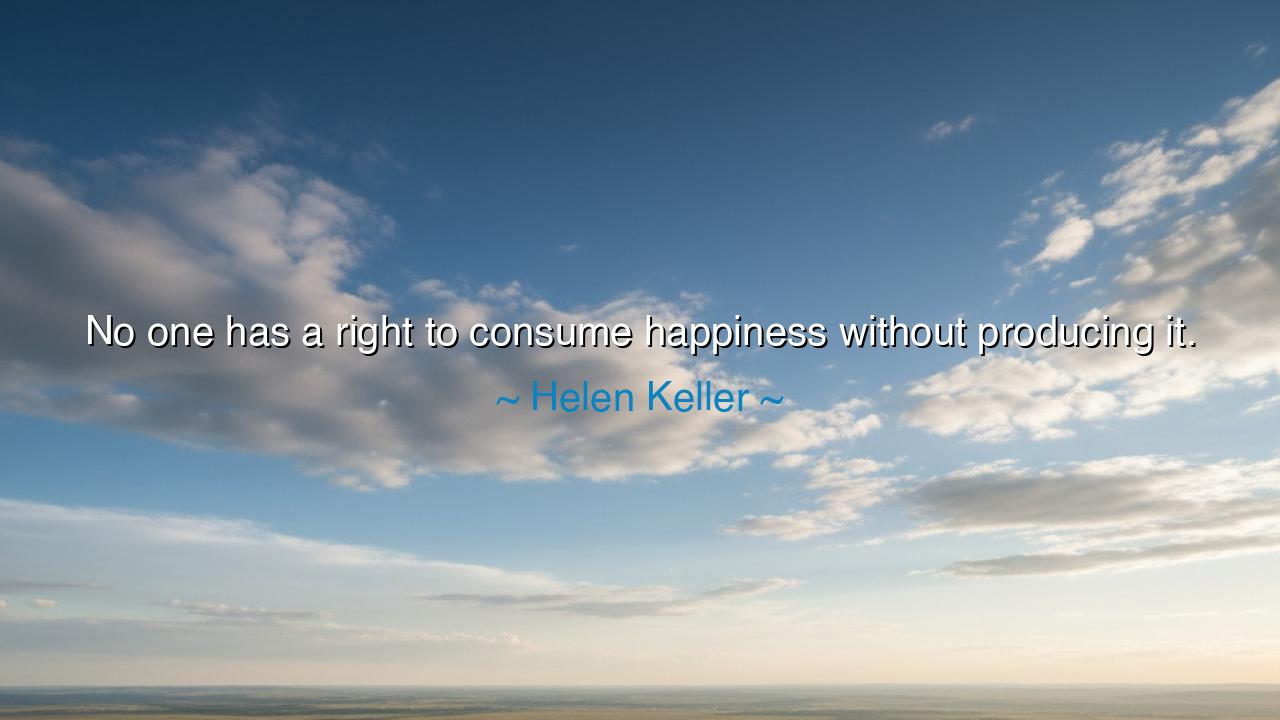
No one has a right to consume happiness without producing it.






The immortal Helen Keller, who dwelt in darkness yet taught the world to see, once proclaimed: “No one has a right to consume happiness without producing it.” In these few words lies a truth vast and eternal — a truth about the sacred balance between receiving joy and giving it, between the blessings we take and the blessings we create. Her voice, rising from a life of silence and blindness, speaks as though from the heart of humanity itself, reminding us that happiness is not a privilege to be possessed, but a responsibility to be shared.
The origin of this quote comes from a woman who knew suffering more intimately than most. Born without sight or hearing, Helen Keller faced a world that seemed impenetrable, yet through perseverance and the guidance of her teacher Anne Sullivan, she discovered not only language but the luminous strength of the human soul. In her long life as a writer, activist, and advocate for the disabled and oppressed, she came to see that happiness could not be hoarded or inherited. It had to be earned through service, through compassion, through the deliberate act of making others’ lives brighter. Her words were not born in comfort but in struggle — and thus carry the authority of one who found joy in giving when the world gave her so little in return.
When Keller said that no one has the right to consume happiness without producing it, she was declaring a moral law as ancient as justice itself. To consume happiness without creating it is to drain the world of its light, to take from the common well without replenishing its waters. Happiness, she understood, is a living flame — it must be passed from soul to soul or it withers into selfishness. True happiness, she teaches, cannot be built upon the unhappiness of others; it must grow from kindness, gratitude, and the quiet labor of love. The farmer earns his bread by tilling the soil; so too must the heart earn its joy by nurturing the joy of others.
History offers many examples of this divine truth. Consider Florence Nightingale, who in the filth and horror of the Crimean War could have fled despair, yet chose instead to bring comfort to the dying and dignity to the suffering. She found happiness not in rest but in service, and her lamp — glowing through the night as she tended to the wounded — became a symbol of human compassion that still burns in memory. Like Keller, she understood that happiness produced through selflessness endures, while happiness pursued through indulgence fades like mist before the sun. For the light that shines within us grows only when it shines upon others.
Keller’s insight also reveals a warning to modern hearts. In an age of abundance, where pleasures are bought and comfort is sought without pause, many have forgotten the sacred duty to produce happiness. We consume endlessly — entertainment, comfort, distraction — yet feel emptier with each indulgence. The ancients would say this is because joy that is taken but not given decays into vanity. To live well is not to gather pleasures, but to generate meaning. Happiness must be an act, not a possession. It is forged through gratitude, friendship, creativity, and service — through lifting others even as we climb.
Thus, let every soul remember: happiness is not a gift owed to you by the world; it is a garden you are called to tend. Sow kindness wherever you walk. Speak words that heal, not harm. Offer help where there is need, and gratitude where there is blessing. The one who gives joy multiplies it; the one who hoards it loses it. When you make another smile, you participate in the divine rhythm of creation — you add to the harmony of existence. To produce happiness is to live as the sun lives, giving light without asking, burning not for itself but for the world it warms.
In the end, Helen Keller’s words are not a command but a calling. They remind us that each of us holds the power to shape the moral climate of our time. Be not a consumer of happiness, but a creator of it. Let your work, your compassion, and your presence become a source of light for those still walking in shadow. For when joy flows outward from the heart, it returns multiplied — and in that eternal exchange, both giver and receiver are made whole. No one has the right to consume happiness without producing it, for the highest joy is not in having, but in giving — not in comfort, but in the creation of goodness that endures beyond the self.






AAdministratorAdministrator
Welcome, honored guests. Please leave a comment, we will respond soon